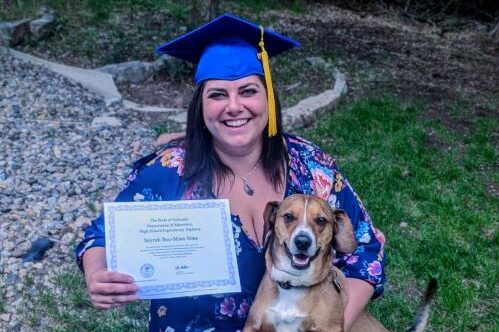Bad News
Sir Hamilton Bones moped on the floor, his chin resting on his paws. His brow sloped into sad angles as he watched his beloved human, Sayrah Sims, digest the bad news that had just dinged her inbox. Sir Hamilton could not read the email himself, but he knew the news wasn’t good when Sayrah slumped forward and said, “Well of course. It takes me 29 years to get around to doing this and what happens? A global pandemic! Just my luck.”
Roughly 50 miles away in Cortez, Kai rested his head gently on Tristan Coleman’s lap. Moments ago, a similar email arrived. Kai thought nothing of it until Tristan fell into such a deep silence after reading it. Kai did what any dog would do and offered cuddly support.
At last, Tristan resolved, “I am someone who does not give up so easily.”
The Question
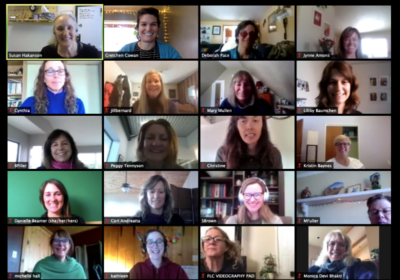 Libby Baumchen, Program Director at the Durango and Cortez Adult Education Centers, welcomed her fellow committee members to the Zoom meeting. With her laptop screen resembling the opening credits of The Brady Bunch, Libby brought everyone up to speed.
Libby Baumchen, Program Director at the Durango and Cortez Adult Education Centers, welcomed her fellow committee members to the Zoom meeting. With her laptop screen resembling the opening credits of The Brady Bunch, Libby brought everyone up to speed.
Yes, a global pandemic had shut down much of the world. Yes, the Centers had swiftly and nimbly shifted their live classes over to virtual classrooms. Not only that, while most GED preparation services typically offer PowerPoint slides as “online instruction,” the Durango and Cortez Centers went above and beyond. Their online instruction consisted of live teaching, group interaction, and customized one-on-one tutoring with instructors.
Despite juggling lockdown orders, suddenly home-schooling children, a mix of overtime or furloughs, on top of many other stressors, students at both Centers were persisting through the turmoil. They were also making gains. If local health officials approved the plan to reopen the Center for testing, then students could complete that most important final step in filling this education gap: pass the four subject tests needed to attain the GED’s high school equivalency diploma.
How, Libby asked the committee, might the Centers create a graduation to honor these devoted students?
“The goal,” she said, “is to give the graduates and their families an opportunity to celebrate their accomplishments. These ceremonies are important in recording life’s big moments and transitions.”
With less than a month to coordinate, the graduation committee got to work.
Paddle Boarding, Anyone?
The email that informed Sayrah of the DAEC’s decision to close classrooms only added to the ongoing chaos. She was overloaded at work as staff she supervised either resigned or opted to stay home rather than risk infection. Before the lockdown orders took effect, she had just wrapped up her 8-week math course at the DAEC. If only she could take that last test! Sayrah stressed. She had always had math anxiety. Because her mother battled a chronic illness, Sayrah’s home school education had largely been self-determined.
“I mean maybe I’d worked up to fifth grade. Maybe. Maybe with a very loose home schooling curriculum,” she explains.
Then, she discovered her zeal for dancing—jazz, tap, ballet, and more. By age 15, Sayrah was earning a steady income as a dance instructor. She wondered: why waste any more time with school?
“If you had asked me when I was 18 if I was gonna ever get my GED, I would have been like: No! Psshh! Kick rocks!”
However, something shifted as she neared the big 3-0. Sayrah wanted to be excited about the landmark birthday, but she knew something was missing. Despite having worked her way up to marketing director for a local dispensary, Sayrah dreaded any future scenario that required her to hand over a résumé. She always had to explain away that tricky little “education” section.
She petted Sir Hamilton as she put away her phone. The dog wagged his tail. He assumed they could now go for an extra long walk or maybe even enjoy some paddle boarding. To his puppish surprise, Sayrah pulled out her math books and began running math drills.
“I’d much rather be paddle boarding,” she confessed to the dog. Even so, she wanted to be ready for her regular Zoom session with Mary Mullen, Lead HSE Teacher and Sayrah’s math instructor.
Release the Robot Army
Danielle Beamer revealed the assembled army to her colleague, Mary Fuller. Both served as Career Advisers at the Durango and Cortez Centers, respectively. Their role in the virtual graduation was clear: outline for students the many bridge services available to them through the BOOST Program. Their goal was to connect the new graduates to the opportunities they needed to achieve social and economic mobility.
Which is why, during a pandemic, Danielle and Mary agreed the robot army was necessary. Even if it did have to come all the way from Japan. They especially approved of the droids carrying signs touting college searches, financial aid and scholarship application coaching.



“A lot of students recognize that this is a really important time to continue their education and are shifting away from job searches and thinking about earning college degrees,” Danielle said.
Mary nodded. “Our local institutions are working hard to make sure that they’ll be able to safely educate students in the fall and being flexible with application elements such as SAT/ACT test scores.”
Danielle added, “Our recent GED grads are actually in a good position in this sense because they have recent scores from a nationally recognized test that colleges can use for placement into appropriate courses.”
Their inspection of the robot army paused when they spotted a droid holding a sign for job prospecting. Job hunting? During these uncertain times? They had to think quickly. Graduation was days away.
Burning the Midnight Oil
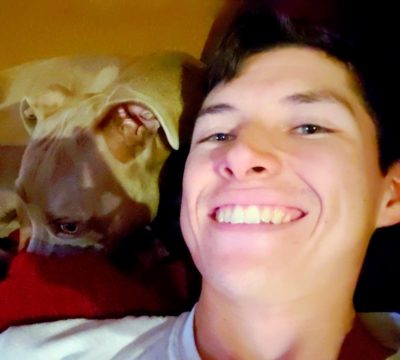
Tristan lounges with dog, Kai
Rustling papers woke Kai from a deep, doggy sleep. Through a groggy, doggy gaze, he saw Tristan curled like a fiddlehead fern frond over his books. Outside, the world beyond the windows was dark fabric sewn from cricket songs.
Late at night was the only time Tristan had to continue his studies. He worked the family’s hay farm by day. And when he wasn’t busy with the work, he cared for his grandmother. Her needs were greater now that her health had declined.
Luckily, Tristan had prior experience learning from home. He’d been home schooled most of his life. He didn’t like to think back on that time, though. “I focus more on trying to move forward. Spend less time thinking about the past and the mistakes I’ve made. I just try to stay positive,” he says.
Back then, he struggled to make any learning gains after the eighth grade. After various upheavals at home, he wound up temporarily homeless until his grandmother took him in.
Now in his 20s, Tristan was on the verge of finally completing his secondary education. He was thriving in his classes at the CAEC. He had his heart set on graduating this year. But how well could he really do on his tests when he had to wait until late at night to study? Could he really grasp all the necessary information alongside his work and caretaking responsibilities? What if he started to fall behind like before?
“When I first started the program, I was…um…not embarrassed, but a bit shy. It was kind of awkward for me. I just had to accept that I didn’t really know so much,” he recalled.
From the bed, Kai stretched and released a rather noisy sigh. He seemed to be openly dismissing Tristan’s worries.
Tristan grinned and stroked Kai’s Graham cracker brown fur. He knew the dog was right. “I have great teachers,” he admitted. “Gretchen—she’s the math teacher at the Cortez Center—she’s very friendly, great, helpful; she’s inspiring and she’s there to help me. There’s Brandi who taught me Language Arts. She’s also helpful, friendly, and so lovable. She really encouraged me to keep practicing. I shouldn’t feel embarrassed because I’m not the only person going through this kind of thing. Just power through it, pay attention, and learn new things.”
And the Graduates Are…
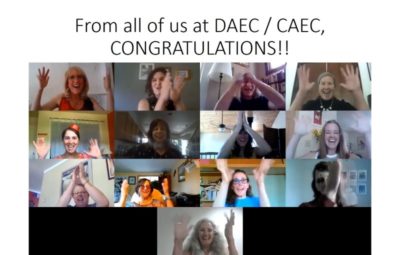
Durango and Cortez teachers and staff applaud the Spring 2020 graduates over Zoom.
“Many people are calling these unprecedented times,” Susan Hakanson said. She addressed her remarks to a rather peculiar audience. “And indeed, it’s nothing like we’ve seen in our lifetimes.”
Normally, the Executive Director of the Durango and Cortez Adult Education Centers would deliver the commencement speech at the Durango Public Library. Normally, families, community members, local dignitaries, and the Centers’ board members, teachers, and staff would pack the conference room bedecked with flowers and streamers. Normally, when “Pomp and Circumstance” faded, the graduates would be seated at the head of the room in their blue robes and mortar boards with gold tassels dangling.
Of course, this was 2020. Nothing was normal.
“We don’t have to look very far back in history to see amazing things happen,” Susan pressed on. “And we can look back and learn from history and see how we as a people can come together and emerge stronger.”
As she spoke, Susan’s audience…that is, her laptop screen, stared at her with its square face and Cyclops camera eye. The Centers’ virtual Spring 2020 graduation was officially underway.
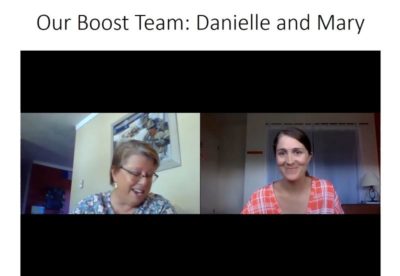
The BOOST Team addresses graduates via the virtual graduation ceremony.
Guest speakers addressed the graduates, heaping on them all due praise while also inspiring them to be bold going forward. Then, Danielle and Mary unleashed their paper pipe android army. In the end, they cleared the droid supporting job hunts.
Despite the uncertainties of the current job market, Danielle noted, “I’m trying to help students think about long-term goals and then break that down into benchmark short-term goals. I think this is always valuable but especially so with more uncertainty.”
Mary concurred, adding, “In many ways, a lot of our GED and ESL students have faced uncertainty in their lives prior to COVID and have the skills to take their goals day by day right now.”
“More than anything though,” Danielle concluded, “I’m trying to focus on making sure that students can maintain some stability right now because barriers like losing housing, limited transportation or amassing debt could prevent students from pursuing their goals moving forward. The last thing we want to see is students and their families, by no fault of their own, enter a cycle of instability that is really hard to escape from.”
At last, the graduates were called out one-by-one. Among them: Sayrah Sims and and Tristan Coleman.
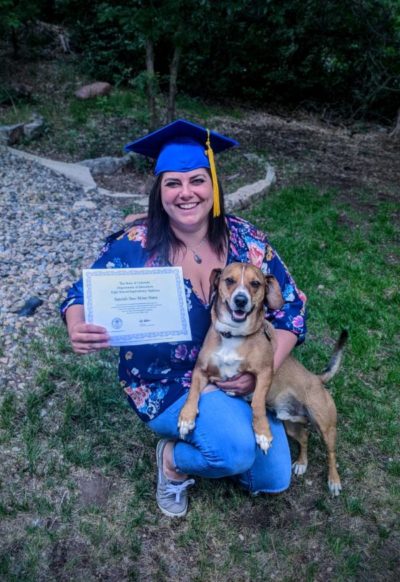
Sayrah and Mr. Bones celebrate together.
“Getting this done has given me such a confidence boost! Knowing inside that I was smart and good enough and could do something like that,” Sayrah declared, unable to hold back joyful tears. “Overall, it was just such a positive experience. The teachers were great! The staff was great! My classmates were great! It was awesome to connect with people who were also trying to better their education. I was like: Hey, I’m not the only one. We’re in this together.”
“This opens opportunities for me,” Tristan says. “It opens doors. It gives me a chance to explore more. Like maybe going to college. I’m a little bit of a computer geek in more of a creative way. Not really in coding and software but more like designing models or developing games or something like that.”
“I think this experience highlights the persistence and dedication it takes to attain a High School Equivalency,” Libby Baumchen underscores. “Students come to us because other models didn’t work for them, however they didn’t give up on themselves. They, like our instructional staff proved that they were flexible and determined to make it happen, even in the face of adversity.”
To anyone considering going back to complete their education, Sayrah says, “Go for it! Only good can come from taking that leap of faith. And they’d probably be surprised with how awesome it is.”
Tristan advises, “Even though it’s kind of difficult to admit that maybe your education is below where you want it or you feel scared to accept that, at the same time, all that fear and anxiety just pushes you away from achieving your goal and your dreams. Trust yourself and look forward to the future even if it is challenging. That’s all an obstacle is anyway.”
Watch the Spring 2020 Virtual Gradation here.


